


Welcome to this month’s update on the engineering goings-on here at the British Airliner Collection. Most of this month’s news is a continuation of previous projects but we will start with something a little different, bird’s nests. Aeroplanes have a great number of inviting places for birds to build their nests and we go to great lengths to prevent them from getting into our airframes as the bird poo and rotting nest is corrosive to the aluminium of the aeroplane. Despite our best efforts our feathered friends sometimes get the upper hand (you may remember we couldn’t remove the cowlings from one of the Britannia engines because of nesting birds.) Well they have done it again, this time on the Trident. When our volunteer, Michael, on the Sunday shift removed a wing access panel just outboard of the undercarriage he couldn’t believe his eyes. The nest was so big it filled a dustbin when it was removed, we can only guess how the birds got in but it was most likely through a hole in the net that covers the undercarriage bay.

The hinge-down panels at the back of the wing which cover the flap drive mechanism were also dropped and new netting fitted in place to try and prevent any access from that direction.
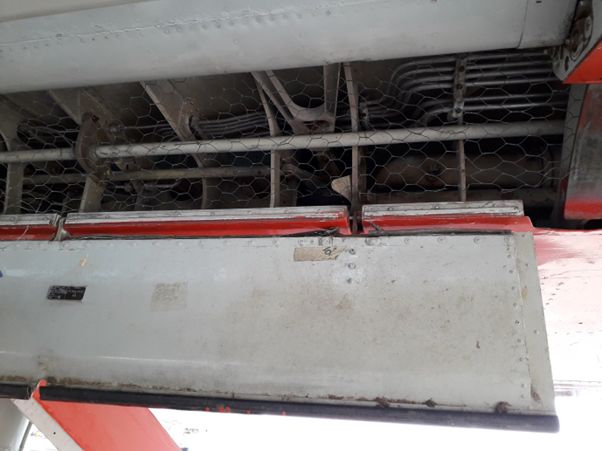
Another job that has been ongoing for a while on the Trident, is the fitting of the CCTV/PA systems. Keith and Simon from the Tuesday team started the job some months ago but had to leave it when the Viscount project and the Herald move started. The Sunday shift have now picked up where they left off and with a final flourish from the Tuesday team the job is now complete. These CCTV/PA systems we are fitting allows us to open up the aircraft to the public in a Covid-responsible way. This means the aircraft steward no longer has to stay on the aircraft but can operate from the bottom of the access steps and control the numberof visitors on board, making it safer for both himself and the visiting public.

Our Ambassador received the final touch to the repaint it had last year when the Dan-Air compass logo decals were recently fitted behind the flight deck windows. The original plan during the repaint was the old decals would be masked and painted around but an over-enthusiastic volunteer painted over them! It has taken quite a long time to get the new ones made but it has made all the difference to LZO’s final appearance.
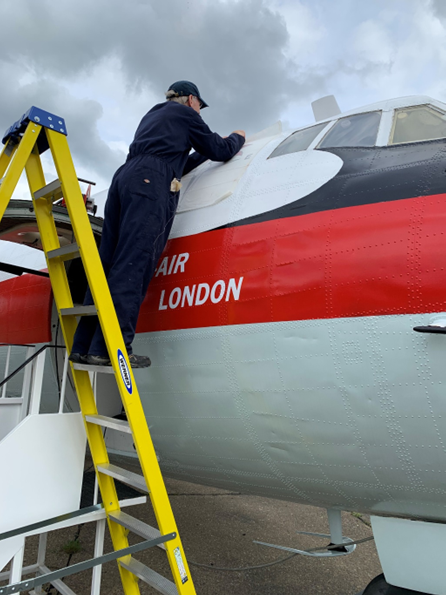
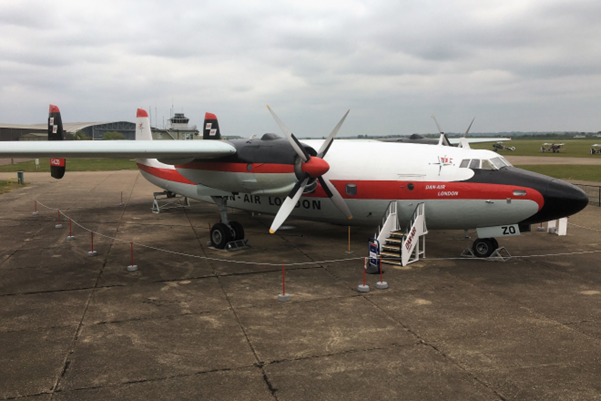
Things are moving slowly on with the BAe146. Das volunteers moved her further down the ramp to make space for the IWM Victor roll out and also to put her in position for the swapping of the engines/wheels/ etc. We are pleased to say the containers with all the parts have arrived at Duxford but we are still awaiting information about when Pionair’s contractors will be on site to carry out the work. Until that is done we are unable to really get to grips with preparing her for public display.
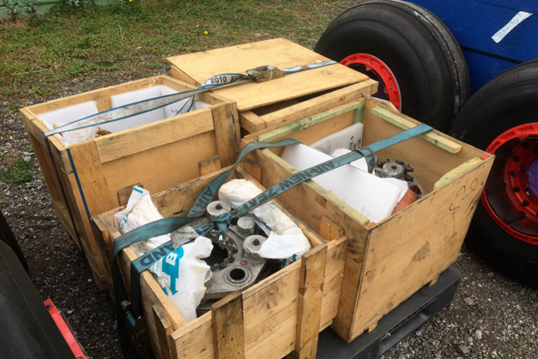
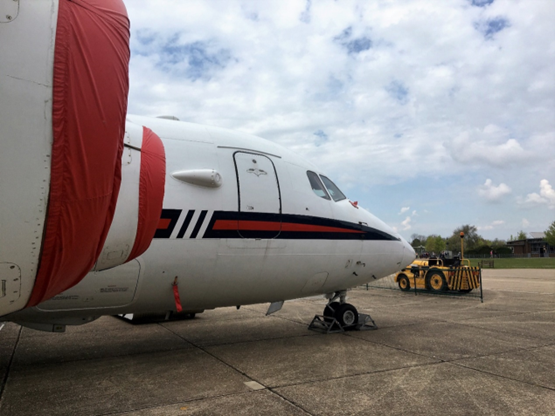
Work is however going on behind the scenes to source suitable steps and power supplies. The damaged set of steps we obtained are being repaired and cleaned ready for painting. During the steam clean process however the high pressure hose for the cleaner split and despite several attempts at a repair it will need replacing before any more heavy cleaning can take place.
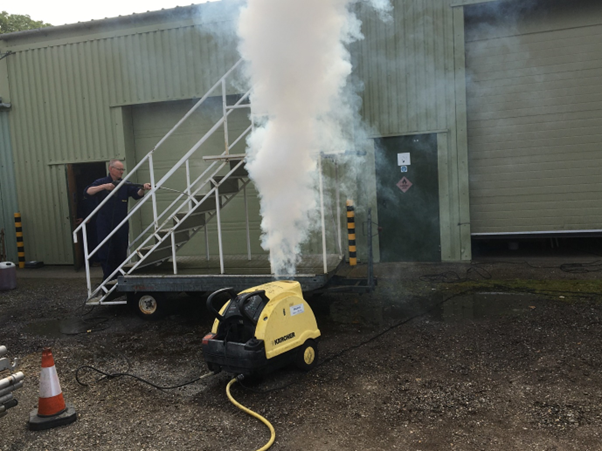
After their sterling job fixing the corrosion on the Britannia undercarriage doors the Sunday group have set some of their volunteers the task of attacking the small amount of tin worm on the underside of the VC10 wing. The corrosion is being cut out and replacement patches made and riveted in place
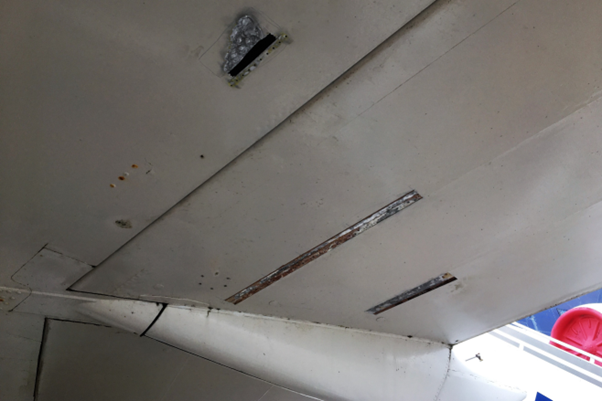
Of course our big project at the moment is still the Viscount interior. You may remember that the cabin side way vinyl could not be fitted until the weather had warmed up to allow the glue to cure. Well the warm days we had recently have now allowed the volunteers to glue the covering on. Once this is finished it will be possible to properly fit the carpet before the seats can go back.
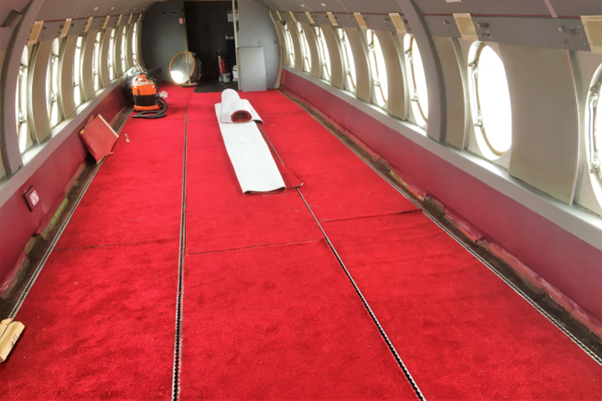
However with all the seats removed it should be possible to replace a few more cloudy windows with refurbished replacements. Several seat units are now complete and are being stored in a container ready for the refit. The seat production line is going well despite another two sets of triple seat units being discovered lurking in a container which nobody ( apart from those who put them there! ) knew about.

We also have a birds nest on the Trislanders number 2 engine up on the tail. One of the rear blanks must have blown out during the storms earlier in the year and the local Jackdaws needed no second invitation. We have removed as much as we could and temporarily filled the gap with some netting until we create a new blank. We are hoping to remove all the cowlings later this year as they are all in need of somer repairs.
In the meantine we took advantage of the recent good weather to remove the seats and clean the carpets. Fortunately the Trislander was designed as a quick change aircraft and so it only took about 40 minutes to remove all the seats with just a couple having stuck retaining pins which needed some encouragement to release.

Once the cabin was clear the side panels and the carpets were cleaned. We are not sure when this was last done but the water was extremely dirty!! We have now placed some plastic protection over the cockpit area where we let our visitors sit.

The minor corrosion on the underside of the wings has now been cleaned, etched and primed so we are moving onto the upper surface which will be much more of a challenge due to the numerous access panels.
The improvement in the weather has not only allowed us to use some glue outside but also to begin the job of washing all the outside aircraft. This is normally done every year but Covid etc has meant this programme was not completed over the last two years so the planes are in need of a good wash.
As ever if you would like to join us in looking after these iconic aeroplanes or becoming a steward to show the public around them, please contact our office on 01223 836593 Tues-Thurs.
Registered Charity No. 285809